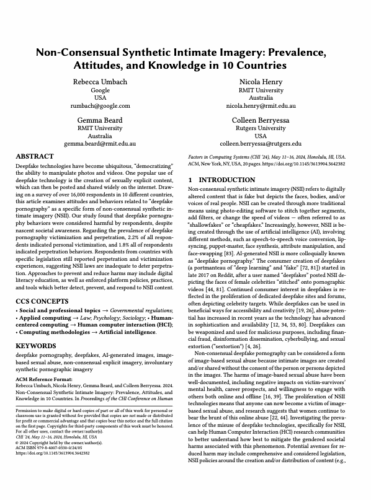Cybercrimes
Non-Consensual Synthetic Intimate Imagery: Prevalence, Attitudes, and Knowledge in 10 Countries.
Open Access: Yes.
Abstract
Deepfake technologies have become ubiquitous, “democratizing” the ability to manipulate photos and videos. One popular use of deepfake technology is the creation of sexually explicit content, which can then be posted and shared widely on the internet. Drawing on a survey of over 16,000 respondents in 10 different countries, this article examines attitudes and behaviors related to “deepfake pornography” as a specific form of non-consensual synthetic intimate imagery (NSII). Our study found that deepfake pornography behaviors were considered harmful by respondents, despite nascent societal awareness. Regarding the prevalence of deepfake pornography victimization and perpetration, 2.2% of all respondents indicated personal victimization, and 1.8% all of respondents indicated perpetration behaviors. Respondents from countries with specific legislation still reported perpetration and victimization experiences, suggesting NSII laws are inadequate to deter perpetration. Approaches to prevent and reduce harms may include digital literacy education, as well as enforced platform policies, practices, and tools which better detect, prevent, and respond to NSII content.
Relevance
Across the ten countries, men were more likely to view and perpetrate deepfake pornography, and. to report victimization, and more likely to rate deepfake behavior as less worthy of criminalization than women.
Citation
Umbach, R., Nicola, H., Beard, G. F., & Berryessa, C. M. (2025). Non-Consensual Synthetic Intimate Imagery: Prevalence, Attitudes, and Knowledge in 10 Countries. Proceedings of the 2024 CHI Conference on Human Factors in Computing System, Article 779. https://doi.org/10.1145/3613904.3642382

